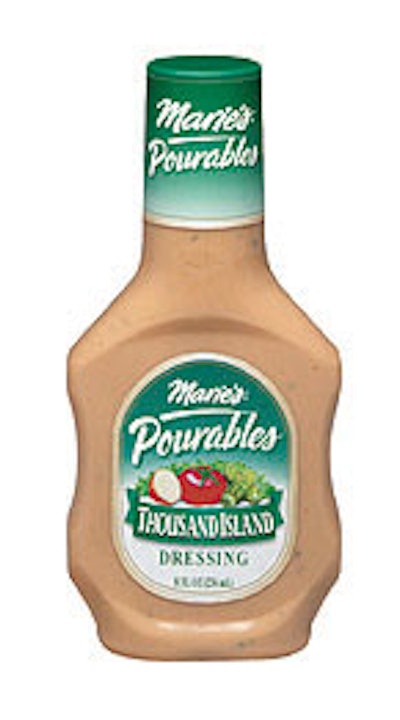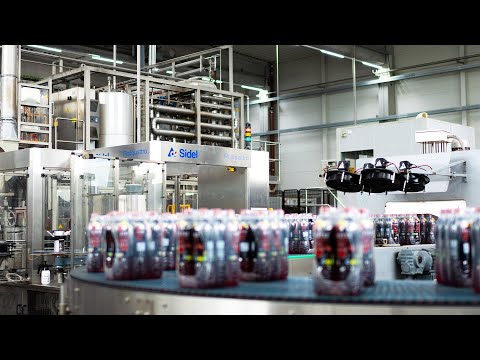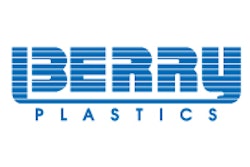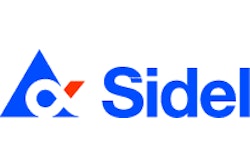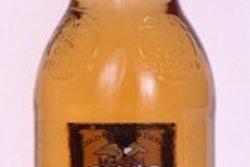Last year, Franklin Park, IL-headquartered Dean Foods created a National Refrigerated Products (NRP) Group to market innovative products with extended shelf life (ESL) through the refrigerated distribution chain.
Lou Nieto, president of the company’s new business group, defines extended shelf life as 60 days and beyond, intermediate shelf life as 40 to 45 days, “which is about the threshold we need to go through the refrigerated distribution system. It allows us to ship product to a customer’s warehouse, and them to ship it to their stores.” He says, “A short shelf life is around 21 days.” Much of the ESL for these products is attributable, he says, to proprietary processing technologies.
In recent months, the NRP business group launched Marie’s Pourables, a line of refrigerated salad dressings sold in polyethylene terephthalate bottles, with a 120-day shelf life. The 8-oz bottle serves as an alternative to the brand’s established 12-oz widemouth glass jar, which is also sold refrigerated, with a similar shelf life. The new package allows consumers to conveniently pour out the fresh dressing, much like traditional shelf-stable dressings, instead of having to spoon it out of a jar. The bottle also eliminates the potential of glass breakage.
Also last year, NRP began to produce and distribute 16-oz PET-bottled NesQuik flavored milks under license from Nestlé USA’s Beverage Div., Glendale, CA. A 32-oz version of the sleek, tapered bottle was introduced late last year. The shelf life of these milks is approximately 60 days. Extending their shelf life is essential to merchandise these products, says Nieto.
Pourable dressings
Marie’s Pourables were introduced in limited Northeast markets last summer. Six 8-oz varieties are sold from refrigerated cases of supermarkets, each marked with a 120-day shelf life. The injection stretch/blow-molded PET bottles are supplied by Owens-Brockway (Toledo, OH). The bottle’s tapered side grips provide pleasing tactility for consumers, according to Dean Foods. Berry Plastics (Evansville, IN) provides what is reportedly an injection-molded polypropylene closure.
A sell-by date is ink-jet-coded onto the bottle’s front recessed panel, just beneath the front label. The samples shown in the photo above, however, are not coded. The colorful front label includes the product’s name, variety, weight, and an image of a serving suggestion. The black-and-white back-panel label lists ingredients, nutrition facts and a bar code. The labels, and a tamper-evident neck band, are supplied by Mail-Well Label (Englewood, CO).
A new labeler was added for Pourables, though Dean’s wouldn’t elaborate on the vendor or filling operation. Through its communications agency, Dean’s did say that no new filling equipment was necessary. Instead, new change parts accommodate product filling.
“The product has done very well for us, and we’re evaluating national distribution of it,” says Nieto. “It appears to be a product/package that’s growing the refrigerated salad dressing segment, and we believe it gives us a competitive advantage. There are a couple of [similar] regional products, but to my knowledge there’s no national brand of refrigerated salad dressing that’s pourable and has an unusually long shelf life.”
Tapered milk bottles
Under its licensing agreement with Nestlé, Dean’s sells NesQuik in about two-thirds of the United States. The milks are filled at facilities in Murray, KY, and Jacksonville, FL.
While Nieto wouldn’t comment on the molding or filling processes, industry sources say injection-molded preforms are stretch-blown into the newer 32-oz bottles (one is shown, p. 80) on a 16-station machine from Sidel (Norcross, GA).
The 16-oz flavored milks are sold in three flavors, with the chocolate flavor also available in a low-fat version. As previously reported, bottles are made and filled at Ryan Foods, the Murray-based Dean’s company.
The equipment used there includes two Sidel Combi SRU 12/24 T machines and one 16/45 T machine. The designations refer to the number of molding stations/filling heads. When the bottles were introduced in ’99, Dean Foods became the first company in the world to use the SRU 12/24 T ultraclean blow/fill/seal system. The equipment sterilizes preforms that are stretch-blown and filled in a sterile environment to achieve the extended shelf life.
“We’ve been transitioning from paper[board] to plastic containers, but we still have paper in the market,” says Nieto. “That started last spring. Sales in the bottle have increased, and the bottle is clearly viewed as superior by consumers because it’s convenient to handle and easier to drink from.”
Packaging matters
Dean’s successful Milk Chugs are also part of Nieto’s NRP group. While Milk Chugs rolled out in ’97, their processing technology has evolved. Initially, the milks offered a traditional 14- to 21-day shelf life. Last year, the company used its proprietary technology to lengthen shelf life to the 40- to 45-day range. Processing technologies and packaging materials allow the intermediate shelf life, Nieto says.
“The intermediate shelf life is used only for a limited market on the West Coast,” Nieto notes. “The vast majority of our Milk Chugs’ business and capacity is still focused” on traditional shelf life. “Where the ISL Chugs are in distribution, they’ve done well,” he says.
“With Milk Chugs, the package is an integral part of the brand.”
The company recognizes that the sales success of these products invites copycats. “We expect competitors to follow our packaging innovation,” says Nieto. Last spring, Dean Foods introduced another product with a long shelf life: Dips-For-One, a four-pack of 2¾-oz single-serve chip dips in thermoformed polypropylene cups with foil-laminated lidstock, sold in an attractive SBS sleeve. The product has a shelf life that exceeds 100 days (see Packaging World, March ’00, p. 112, or www.packworld.com /go/dipsforone). Shelf life is similar to Dean’s other refrigerated dips sold in a more traditional resealable container/lid combination.
In an effort to continue to introduce new products, Nieto says, Dean’s “is working to develop both processing and packaging technologies. We need to have products with a minimum of 40 to 45 days of shelf life. We’ve looked at [alternative] materials for longer shelf life, and our purchasing department always likes to work with more than one vendor.”
He continues, “We’ve invested in new technologies, machinery, and upgrading facilities. I can’t talk about them because we view packaging as being critical to our success. Packaging innovation is at the core of our major new product successes at Dean Foods. And while I don’t think the company’s view of packaging has changed, I think we’ve recognized with Milk Chugs and Dips-For-One how powerful packaging innovation can be in developing new products,” Nieto asserts.
